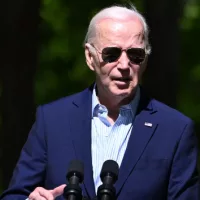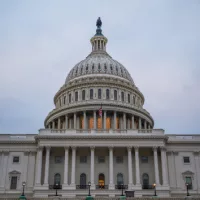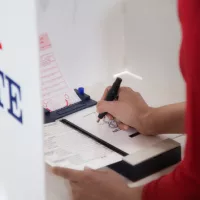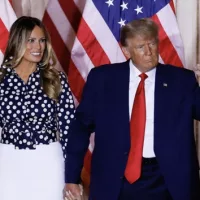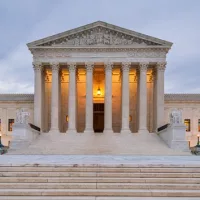
 ABC News(WASHINGTON) — From rural towns to big cities and at both public events and private fundraisers, lawmakers home in their districts this week have been bombarded by energized and engaged crowds demanding answers and determined to make their voices heard.
ABC News(WASHINGTON) — From rural towns to big cities and at both public events and private fundraisers, lawmakers home in their districts this week have been bombarded by energized and engaged crowds demanding answers and determined to make their voices heard.
Republican members of Congress brave enough to hold public town halls have been booed, yelled at, and cornered with tough questions about story lines coming out of Washington, such as reported contacts between members of President Trump’s campaign and Russia, that many from both sides of the aisle have said they find worrisome.
Frustrated crowds have found ways to catch up to some senators and representatives who have shied away from holding public events. On Wednesday in Kentucky, swarms of people protested outside ticketed events that GOP Senate Majority Leader Mitch McConnell attended. In Vista, California, Republican Rep. Darrell Issa did not have an open forum on the books this week, but angry protesters camped outside his office until he came out to talk to them.
Reports of these milk jugs spotted in local stores all over the 8th district #WhereIsPaulCook @RepPaulCook @VVDailyPress pic.twitter.com/RsVLAgCw9n
— Where Is Paul Cook (@WhereIsPaulCook) February 20, 2017
In many ways, the week has been a tour de force of Democratic campaign strategy and grassroots organizing. From running ‘missing-person’ ads to renting billboards, organizers have used a number of creative methods to draw attention to lawmakers seen as avoiding the public. Lists were circulated detailing where Congress members would be during the week and tips distributed on how best to raise concerns at representatives’ town hall meetings.
Last week, after GOP Rep. Jason Chaffetz faced a particularly rambunctious crowd in his Utah district, he tried to dismiss those who came as out-of-towners. So this week, at meetings from Virginia to Colorado, attendees have worn badges with their ZIP codes or held up their driver’s licenses to prove their residency. Another common tactic: green and red signs for people to hold up when they agree or disagree with something said at an event. The colorful visual plays well for the cameras.
Everyone holding up their CO driver's license to prove that it's all Coloradans wanting to talk with @SenCoryGardner ???? pic.twitter.com/hIySskpeZA
— IndivisibleNOCO (@IndivisibleNOCO) February 22, 2017
A number of concerns have come to the fore. From coast to coast, voters are asking their congressional representatives what a Republican “repeal and replace” plan for the Affordable Care Act might look like. Will young people be able to stay on their parents’ plans? Are health saving accounts helpful? How would block grants to states for Medicaid impact services?
During an interview after his town hall, GOP Rep. Scott Taylor of Virginia acknowledged that a lack of specificity from Republican leadership about what they will do with Obamacare is adding to the unease.
Taylor said it could be anytime from a month to years before final health care legislation is complete. “It is extremely important and imperative that people who are working on that repeal and replacement are very deliberative … We better get it right. I think it is responsible to be methodical about it,” he told ABC News.
A few hours away in northern Virginia, another Republican representative, Dave Brat, said after his boisterous town hall that he doesn’t know his own party’s plan for health care and that is a problem. He said he is frustrated by the fact that leadership sent him home, into the lion’s den, without any answers.
“People are saying I am not giving the full story,” he said.
There is also notable concern and confusion about the Trump administration’s relationship with Russia. At Taylor’s event, a woman stood and said she voted for him but that she was disappointed he had stood by during what she saw as Trump’s efforts to play nice with Russian President Vladimir Putin.
“Russia was just implicated, by all 17 of our U.S. intelligence agencies, as having interfered in our elections,” Lulani Gillikin, a nonprofit worker who lives in Taylor’s district, stood and said to the congressman. “Why would you even consider being any type of frenemy with Russia when they are continuing to have this type of misinformation and disinformation, which is sad, and it looks like there is a probable link with the campaign of our current president?”
Taylor answered saying that he thought Russia should be held accountable for some of its leaders’ actions and that he supports a Senate investigation into Russia’s alleged interference in the U.S. election.
“The reality is in the international community that there are things that historically we have worked together with them on even though they are enemies and it has to happen sometimes for international order,” the congressman added.
Many questions posed to Republican lawmakers also centered around the idea of if, when and how they might be willing to stand up against the White House or break party lines.
“What can you say to me and the people in your district to ensure us that you will support all the needs of the people and, when necessary, you will speak out against policies that are wrong, no matter if it comes from the president or one of your colleagues,” James Harvey, a constituent of Taylor’s asked the congressman after thanking him for hosting the event. “That you will not be a ‘go-along to get along’ representative. You say you are ‘Republican leaning,’ but there is also right and wrong.”
Taylor, newly elected in November, said he agreed it is important to work across the aisle and highlighted relationships he is building with some of his Democratic colleagues. He said he is impressed by all of his fellow “freshmen” representatives on the Hill and proud that they have signed a pledge to be civil and work together across party lines.
Copyright © 2017, ABC Radio. All rights reserved.






